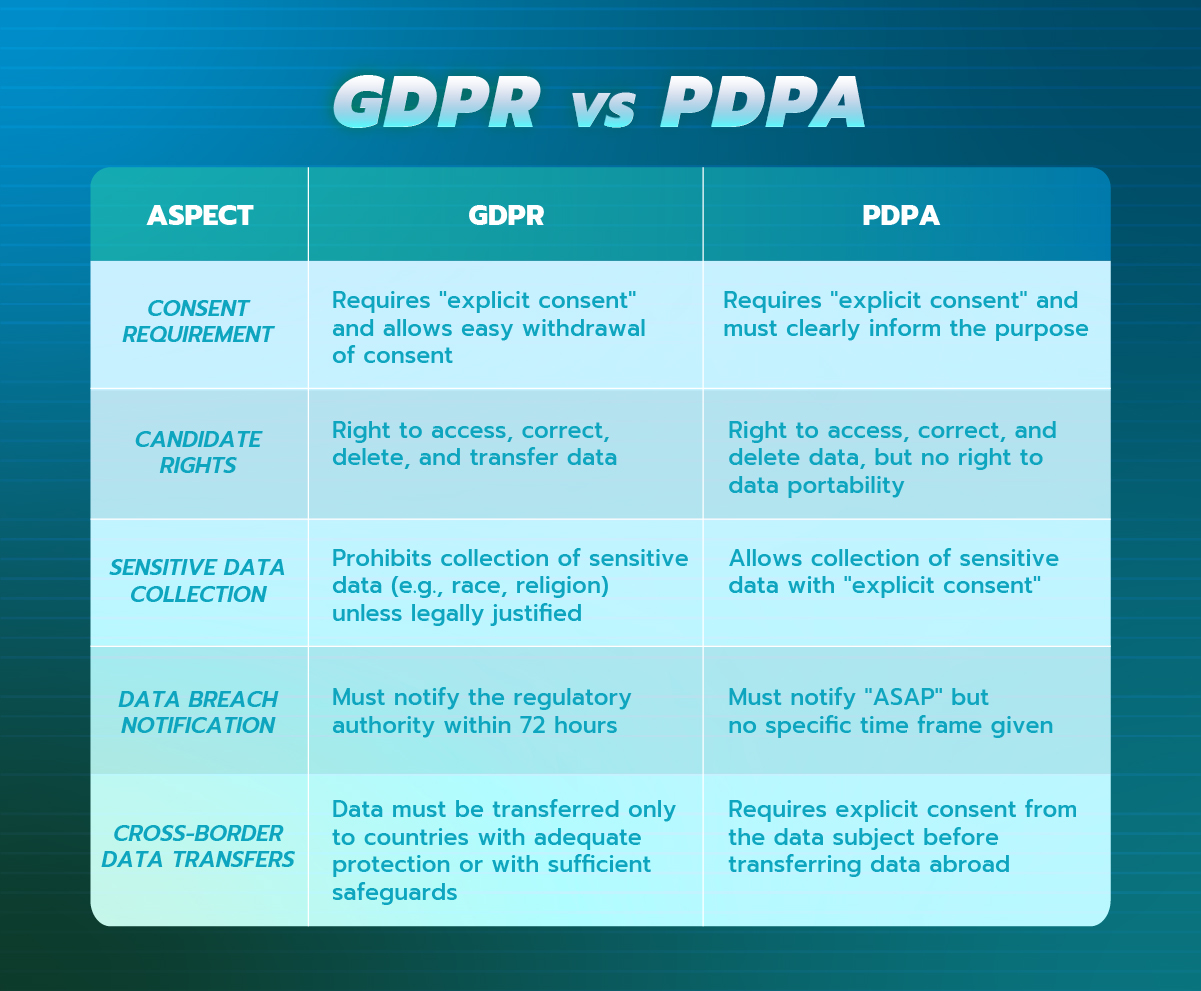GDPR vs PDPA: A Comparison of Data Protection Laws in Recruitment in Thailand

In the digital age, personal data protection has become increasingly important. Data protection laws have been implemented worldwide to safeguard individuals’ privacy. Two of the most significant regulations in this field are the General Data Protection Regulation (GDPR) of the European Union and Thailand’s Personal Data Protection Act (PDPA). While both laws share similar objectives, they have distinct differences, especially in the recruitment context. Let’s explore the similarities and differences between GDPR and PDPA and what employers need to comply with.
What Are GDPR and PDPA?
What is GDPR?
The GDPR is the data protection law of the European Union, enforced since 2018. It sets a high standard for the protection of personal data for EU citizens, regardless of where their data is processed. Any company that collects or processes the data of EU citizens must comply with GDPR.
And What is PDPA?
Thailand’s PDPA, effective since 2022, is a data protection law modeled after GDPR but tailored to the local context. It applies to organizations that collect, use, or disclose personal data of individuals in Thailand.
Comparison of GDPR and PDPA in Recruitment

Compliance With GDPR and PDPA in Recruitment
1. Collecting Personal Data
- Candidates must be informed about the purpose of data collection and its use.
- Only necessary data for recruitment should be collected.
2. Obtaining Consent
- Explicit consent must be obtained from candidates before collecting their data.
- Candidates should be allowed to withdraw consent at any time.
3. Data Security Measures
- Organizations must implement measures to prevent unauthorized access, such as data encryption and access restrictions.
4. Sharing Data with Third Parties
- If data is shared with third parties (e.g., background check companies), candidates’ explicit consent is required beforehand.
5. Data Retention and Deletion
- Organizations should not retain data of unsuccessful candidates longer than necessary.
- Data must be deleted when no longer needed or when requested by the candidate.
Aligning GDPR and PDPA Compliance in Recruitment
Since many recruitment agencies in Thailand deal with both local and international candidates, aligning GDPR and PDPA compliance ensures seamless operations. Here are key steps to enhance compliance:
- Update Privacy Policies: Clearly outline how candidate data is collected, stored, and processed under both GDPR and PDPA.
- Obtain Explicit Consent: Ensure candidates provide informed consent before data collection, as required by both regulations.
- Secure Data Storage: Use encrypted databases and restrict data access to authorized personnel.
- Regular Compliance Audits: Conduct periodic checks to ensure adherence to both GDPR and PDPA regulations.
Best Practices for GDPR and PDPA Compliant Recruitment
- Use Secure Recruitment Software: Invest in applicant tracking systems (ATS) that comply with GDPR and PDPA regulations.
- Educate Your Team: Conduct training sessions to keep HR professionals updated on data protection laws.
- Create a Data Retention Policy: Define how long candidate data will be stored and establish procedures for secure disposal.
- Implement Data Breach Response Plans: Be prepared to address security incidents swiftly to mitigate potential risks.

Key Considerations for Businesses in Thailand
Although PDPA is influenced by GDPR, there are still differences in certain details. Businesses in Thailand that recruit candidates from the EU must comply with GDPR as well, adding complexity. Therefore, companies should thoroughly understand both laws and adjust their recruitment processes accordingly.
Conclusion
While GDPR and PDPA both aim to protect personal data, they differ in specific requirements. Businesses operating in Thailand must comply with PDPA, while those handling European candidates’ data must also adhere to GDPR. Ensuring compliance with these regulations will help maintain secure and lawful recruitment practices.
If you need further guidance on PDPA and GDPR compliance in recruitment, contact our legal experts for a free consultation!
Source:
https://www.arit.rmutt.ac.th/2022/06/08/pdpa/
https://pdpathailand.com/news-article/gdpr-pdpa/
https://www.acisonline.net/?p=8802

